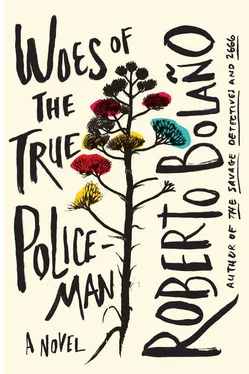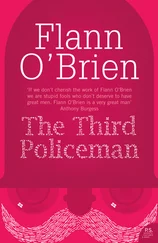Later he explained that Delorme was the concierge of the building where he lived in the early 1960s. The context in which he referred to him was one of fear. Fears, frights, attacks, surprises, etc. Derville mentions him as part of a list of bizarre writers handed to him by Arcimboldi just before the publication of The Librarian. According to Derville, Arcimboldi confessed that he had grown afraid of Delorme, believing that he cast spells and performed Satanic rituals and black masses in his cramped concierge quarters, by means of which he hoped to improve his written French and the pacing of his stories. And that was all. Padilla promised that he would delve further and report back soon. Was Arcimboldi’s disappearance related to the barbaric writers? He didn’t know but he would keep up the investigation.
That night, after rereading the letter for the fourth or fifth time, Amalfitano had to get out of the house. He put on a light jacket and went for a walk. His steps led him to the center of the city, and after wandering around the plaza where the statue of General Sepúlveda stood with its back to the sculpture group commemorating the victory of the city of Santa Teresa over the French, he found himself in a neighborhood that, though only two blocks from the city center, displayed — even flaunted — every stigma, every sign of poverty, squalor, and danger. A no-man’s-land.
The term amused Amalfitano, eliciting feelings of bitterness and tenderness; he too, over the course of his life, had known no-man’s-lands. First the working-class neighborhoods and the industrial belts; then the terrain liberated by the guerrilla. Calling a neighborhood of prostitutes a no-man’s-land, however, struck him as felicitous and he wondered whether those distant danger zones of his youth weren’t simply giant prostitution belts camouflaged in Rhetoric and Dialectic. Our every effort, our long prison revolt: a field of invisible whores, the glare of pimps and policemen.
Suddenly he was sad and also starving. In blatant disregard of gastrointestinal prudence and caution, he stopped at a cart on the corner of Avenida Guerrero and General Mina and bought a ham sandwich and a hibiscus drink that in his fevered imagination was like the jasmine nectar or Chinese peach blossom juice of his childhood. The fucking insane wisdom, the discernment of these Mexicans, he thought as he savored one of the best sandwiches of his life: between two slices of bread, sour cream, black bean paste, avocado, lettuce, tomato, three or four slices of chipotle chile, and a thin slice of ham, which was what gave the sandwich its name and at the same time was the least important part. Like a philosophy lesson. Chinese philosophy, of course! he thought. Which reminded him of the following lines from the Tao Te Ching: “Mystery defines him. And in that mystery lies the gate of all that is most wonderful.” What defines Padilla? he wondered, walking away from the stand toward a big floodlit sign in the middle of Calle Mina. The mystery, the wonder of being young and unafraid and then suddenly afraid. But was Padilla really afraid? or were the signs that Amalfitano interpreted as fear actually indications of something else? In big red letters, the sign announced Coral Vidal, singer of rancheras; a communicative striptease; and a magician, Alexander the Great. Under the marquee, amid a swarm of insomniacs, were vendors of cigarettes, drugs, dried fruit, magazines, and newspapers from Santa Teresa, Mexico City, California, and Texas. As he was paying for a Mexico City paper — any of them, the Excélsior , he told the vendor — a boy tugged at his sleeve.
Amalfitano turned. The boy was dark, thin, about eleven, wearing a yellow University of Wisconsin sweatshirt and running shorts. Come, sir, follow me, he insisted in the face of Amalfitano’s initial resistance. A few people had stopped and were staring at them. Finally he decided to obey. The boy turned down a side street full of tenements that seemed on the verge of collapse. The sidewalks were lined with cars that had been sloppily parked or, to judge by their sorry state, abandoned by their owners. From inside some apartments came a cacophony of angry voices and televisions blaring at full volume. Amalfitano counted at least three signs for cheap hotels. Their names struck him as picturesque, but not as picturesque as the sign on Calle Mina. What did communicative striptease mean? Did the audience undress too or did the stripper announce the items that she was about to take off?
Suddenly the street fell silent, as if drawing in on itself. The boy stopped between two particularly dilapidated cars and met Amalfitano’s eyes. At last, Amalfitano understood and shook his head. Then he forced a smile and said no, no. He took a bill out of his pocket and put it in the boy’s hand. The boy took it and tucked it into one of his sneakers. When he bent down a ray of moonlight seemed to fall on his small, bony back. Amalfitano’s eyes filled with tears. Mystery defines him , he remembered. Now what? asked the boy. Now you go home and go to bed, said Amalfitano, and immediately he realized how stupid his chiding was. As they walked back, this time side by side, he pulled out more money and gave it to him. Wow, thanks, said the boy. Get yourself something to eat this week, said Amalfitano with a sigh.
Before they left the street they heard sobbing. Amalfitano stopped. It’s nothing, said the boy, it comes from over there, it’s La Llorona. The boy pointed to the front door of a house in ruins. Amalfitano approached with hesitant steps. In the darkness behind the door, the sobs could be heard again. They came from above, from one of the upper floors. The boy stood next to him and pointed the way. Amalfitano took a few steps in the darkness but was afraid to follow the sound. When he turned he saw the boy standing there, balancing on a piece of rubble. It’s some guy from around here who’s dying of AIDS, he said glancing absentmindedly toward the upper floors. Amalfitano said nothing. On Calle Mina they parted ways.
A week later Amalfitano returned with Castillo to the street where he’d heard the sobs. He found the house without difficulty: by the light of day it didn’t look as terrible as it had that night. In the entryway someone had tried to build a barricade. Inside, however, the building was in slightly better shape, though the windows had no glass and the hallways were a succession of rubble and holes.
Should we go in? asked Castillo, with a squeamish look on his face. Amalfitano didn’t answer and began to poke around. In a room on the second floor he found a mattress and a couple of dirty blankets. This is it, come up, he called. In a corner was a kind of improvised brick hearth, and above it, dug into the wall, a rough niche holding a pot, a griddle, two soup spoons, and a plastic cup. At the foot of the mattress — on the floor but in relatively neat stacks — were movie magazines, everything from trash to art monographs, the latter in English but with lots of photographs. The spacing of the mattress, niche, and magazines conveyed a subtle and desperate sense of order holding at bay the chaos and ruin of the rest of the house.
Amalfitano knelt to get a better look at the objects. This is like reading a letter from a dying man, he said when he was done with his scrutiny. Castillo, leaning in the doorway, shrugged. What does the letter say? he asked grudgingly. I can’t read it, it’s in a foreign language, though sometimes I think I recognize one or two words. Castillo laughed. What words: love, loneliness, desperation, rage, sadness, isolation? No, said Amalfitano, nothing like that. The word I see gives me the shivers because I never would have thought I’d find it here. What is it, then, let’s hear it. Hope, said Amalfitano, but so softly that at first Castillo didn’t hear him. Hope, he repeated. Oh, that, said Castillo, and after a few seconds he added: I have no idea where you see it, there’s more filth here than hope. Amalfitano stared at Castillo (Padilla would have understood) and smiled. Castillo returned the smile. When you’re like this, when you smile like that, he said, you look like Christopher Walken. Amalfitano gave him a grateful look (he knew very well that he looked nothing like Christopher Walken, but it was nice to hear Castillo say he did) and went back to rummaging through the room. Suddenly it occurred to him to lift up the mattress. Underneath, as if put there to iron out the wrinkles, he found a Hawaiian shirt. The shirt was green with swaying palm trees and blue waves tipped with the purest white foam and red convertibles and white hotels and yellow cake and tourists dressed in Hawaiian shirts identical to the Great Hawaiian Shirt with swaying palm trees and blue waves and red convertibles as if infinitely repeated in a pair of facing mirrors. No, not infinitely, thought Amalfitano. In one of the reflections, one of the layers, the tourists would be unsmiling, their shirts black. The images on the shirt sprang from the floor and clung to the back of Amalfitano’s troubled spirit. The rotting smell that suddenly swept over the room made him cover his nose and gag. The shirt was rotten. From the doorway Castillo made a face of disgust. Someone died here, said Amalfitano. Where’s the body, Sherlock? asked Castillo. At the morgue, of course. Oh, you can be so negative, sighed Castillo.
Читать дальше








![О Генри - Бляха полицейского О’Руна [The Badge of Policeman O'Roon]](/books/405347/o-genri-blyaha-policejskogo-o-runa-the-badge-of-po-thumb.webp)



